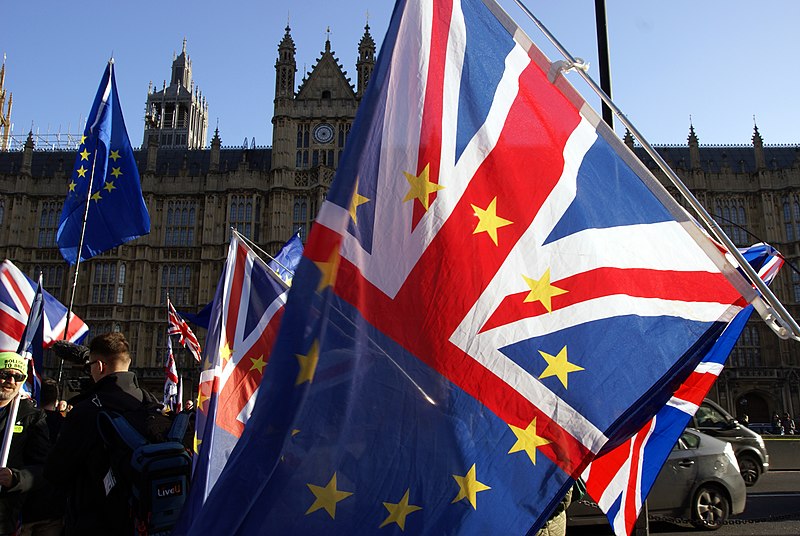UK News
-
 UK arrests three men over alleged China espionage links, reports say one is partner of MP
British counter-terrorism police have arrested three men on suspicion of assisting China’s foreign intelligence services, escalating tensions between London and BeijingRead More...
UK arrests three men over alleged China espionage links, reports say one is partner of MP
British counter-terrorism police have arrested three men on suspicion of assisting China’s foreign intelligence services, escalating tensions between London and BeijingRead More... -
 UK imposes emergency visa curbs on students and Afghan workers as asylum claims surge
Britain will block study visas for nationals of four countries and suspend work visas for Afghans in a sweeping move the government says is needed to stem a sharp rise in asylum claims madeRead More...
UK imposes emergency visa curbs on students and Afghan workers as asylum claims surge
Britain will block study visas for nationals of four countries and suspend work visas for Afghans in a sweeping move the government says is needed to stem a sharp rise in asylum claims madeRead More... -
 UK pumps £30m into satellite communications push to win bigger slice of £40bn global market
The UK government is stepping up its bid to become a major force in satellite communications, unveiling £30 million in fresh funding for British space firms targeting aRead More...
UK pumps £30m into satellite communications push to win bigger slice of £40bn global market
The UK government is stepping up its bid to become a major force in satellite communications, unveiling £30 million in fresh funding for British space firms targeting aRead More... -
 UK expands flights from Oman to evacuate vulnerable Britons as Gulf tensions rise
The UK government is working with commercial airlines to increase the number of flights leaving Oman, as it moves to prioritise the evacuation of vulnerable British nationals from the region.Read More...
UK expands flights from Oman to evacuate vulnerable Britons as Gulf tensions rise
The UK government is working with commercial airlines to increase the number of flights leaving Oman, as it moves to prioritise the evacuation of vulnerable British nationals from the region.Read More... -
 Royal Docks unveils UK’s first Circular Construction Hub, powering London’s path to Net Zero by 2030
London has taken a major step towards a greener future with the launch of the UK’s first Circular Construction Hub in the Royal Docks — a flagship project that aims toRead More...
Royal Docks unveils UK’s first Circular Construction Hub, powering London’s path to Net Zero by 2030
London has taken a major step towards a greener future with the launch of the UK’s first Circular Construction Hub in the Royal Docks — a flagship project that aims toRead More...

Culture
-
 UK music exports get £1.4m boost as 68 independent artists win global growth grants
Rising British music talent is set for a global push after 68 independent UK acts secured a combined £1.4 million in government-backed funding designed to grow international audiences, boostRead More...
UK music exports get £1.4m boost as 68 independent artists win global growth grants
Rising British music talent is set for a global push after 68 independent UK acts secured a combined £1.4 million in government-backed funding designed to grow international audiences, boostRead More... -
 Emery Walker revealed: new exhibition explores the man behind the arts and crafts legend
A new exhibition opening this spring at Emery Walker’s House sets out to restore depth, warmth, and personality to one of Britain’s most influential yetRead More...
Emery Walker revealed: new exhibition explores the man behind the arts and crafts legend
A new exhibition opening this spring at Emery Walker’s House sets out to restore depth, warmth, and personality to one of Britain’s most influential yetRead More... -
 London confirms St Patrick’s Day 2026 parade and Trafalgar Square festival
London will turn green once again next spring after the Mayor confirmed the capital’s St Patrick’s Day celebrations will take place on Sunday 15 March 2026, with aRead More...
London confirms St Patrick’s Day 2026 parade and Trafalgar Square festival
London will turn green once again next spring after the Mayor confirmed the capital’s St Patrick’s Day celebrations will take place on Sunday 15 March 2026, with aRead More... -
 Masterpieces beyond the Museum: National Gallery brings life-size art to communities ccross the UK
World-famous paintings from the National Gallery are stepping out of Trafalgar Square and into everyday life, as part of a major touring project that will seeRead More...
Masterpieces beyond the Museum: National Gallery brings life-size art to communities ccross the UK
World-famous paintings from the National Gallery are stepping out of Trafalgar Square and into everyday life, as part of a major touring project that will seeRead More... -
 Award-winning Polish writer Mariusz Szczygieł brings ‘Not There’ essay collection on UK tour
Polish writer Mariusz Szczygieł, one of Central Europe’s most acclaimed literary reporters, will tour the UK later this month with a series of public events marking the English-language release...Read More...
Award-winning Polish writer Mariusz Szczygieł brings ‘Not There’ essay collection on UK tour
Polish writer Mariusz Szczygieł, one of Central Europe’s most acclaimed literary reporters, will tour the UK later this month with a series of public events marking the English-language release...Read More... -
 Professor Dame Carol Black GBE reappointed as Chair of the British Library for 2026–2027
The UK Secretary of State has confirmed the extension of Professor Dame Carol Black GBE as Chair of the British Library, continuing her leadership from 1 September 2026 to 31 August 2027.Read More...
Professor Dame Carol Black GBE reappointed as Chair of the British Library for 2026–2027
The UK Secretary of State has confirmed the extension of Professor Dame Carol Black GBE as Chair of the British Library, continuing her leadership from 1 September 2026 to 31 August 2027.Read More... -
 Climate, community and care: Soma Surovi Jannat’s landmark exhibition at the Ashmolean Museum
From spring through autumn 2026, the Ashmolean Museum presents 'Soma Surovi Jannat: Climate Culture Care', a powerful new exhibition that places climateRead More...
Climate, community and care: Soma Surovi Jannat’s landmark exhibition at the Ashmolean Museum
From spring through autumn 2026, the Ashmolean Museum presents 'Soma Surovi Jannat: Climate Culture Care', a powerful new exhibition that places climateRead More... -
 Londoners on trial: 700 years of crime revealed in a free City archives exhibition
From medieval pickpockets to notorious Victorian figures, seven centuries of crime, punishment and public fascination are laid bare in a new exhibition atRead More...
Londoners on trial: 700 years of crime revealed in a free City archives exhibition
From medieval pickpockets to notorious Victorian figures, seven centuries of crime, punishment and public fascination are laid bare in a new exhibition atRead More... -
 Lost for centuries, Henry VIII’s golden love pendant finds a home at the British Museum
A golden heart pendant once symbolizing the doomed marriage of Henry VIII and Katherine of Aragon has finally been secured for permanent display at the BritishRead More...
Lost for centuries, Henry VIII’s golden love pendant finds a home at the British Museum
A golden heart pendant once symbolizing the doomed marriage of Henry VIII and Katherine of Aragon has finally been secured for permanent display at the BritishRead More... -
 British High Commission hosts Caledonian Ball in Lahore to celebrate growing Scotland–Pakistan partnership
The British High Commission brought a touch of Scotland to Lahore this week as it hosted the Caledonian Ball at the historic Sir Ganga Ram Residence, celebratingRead More...
British High Commission hosts Caledonian Ball in Lahore to celebrate growing Scotland–Pakistan partnership
The British High Commission brought a touch of Scotland to Lahore this week as it hosted the Caledonian Ball at the historic Sir Ganga Ram Residence, celebratingRead More... -
 300-year-old Rysbrack Marble putti blocked from export as UK scrambles to save national treasure
A three-century-old marble sculpture by renowned eighteenth-century sculptor Michael Rysbrack has been placed under a temporary UK export ban, giving BritishRead More...
300-year-old Rysbrack Marble putti blocked from export as UK scrambles to save national treasure
A three-century-old marble sculpture by renowned eighteenth-century sculptor Michael Rysbrack has been placed under a temporary UK export ban, giving BritishRead More... -
 Inside ICG PR: how an international PR agency shapes reputation for luxury, fashion, and cultural brands
Interview: the co-founder of Iris Consulting Group Iryna Kotlyarevska on building global visibility with cultural intelligenceRead More...
Inside ICG PR: how an international PR agency shapes reputation for luxury, fashion, and cultural brands
Interview: the co-founder of Iris Consulting Group Iryna Kotlyarevska on building global visibility with cultural intelligenceRead More...

British Queen celebrates
Most Read
- Teen held after US woman killed in London stabbings
- Heave-ho Harry! Prince prepares to join the walking wounded in ice trek to North Pole
- Football: Farhad Moshiri adamant Everton deal above board
- "Master of English Style". Interview with Designer Lydia Dart
- Letter to the Financial Times from Lord Mayor Alderman Michael Bear
World News

Ambassador Neil Holland says following Russia's illegal annexation of Crimea in 2014, the Crimean Tatars have endured ruthless persecution at the hands of the Russian regime.

The country of Italy is grappling with the aftermath of severe flooding that has claimed the lives of nine individuals and forced around 13,000 people to evacuate their homes. The calamity was

The UK and Norway agree to develop a strategic partnership to counter shared threats in the undersea domain, including threats to our undersea infrastructure.

The UK will back President Biden’s drive to remove and store global carbon emissions as it forges ever-closer links with the United States on energy security.

The upcoming local council elections in Northern Ireland are taking center stage as the Democratic Unionist Party (DUP) seeks to leverage them to push for further

Defence Secretary Ben Wallace met with his counterpart Defence Minister Boris Pistorius in Berlin today, days after announcing that the UK will be the first nation to

The Prime Minister met European Commission President Ursula Von der Leyen at the Council of Europe Summit in Iceland today.

Former French President Nicolas Sarkozy left the courthouse today after an appeals court in France upheld a three-year prison sentence, with two years suspended, for his involvement in

Former British Prime Minister Liz Truss will deliver a speech in Taiwan, emphasizing the importance of avoiding appeasement towards China and expressing unwavering

Renowned novelist Salman Rushdie has issued a warning about the severe threats to freedom of expression and publishing currently facing Western countries, calling it




















